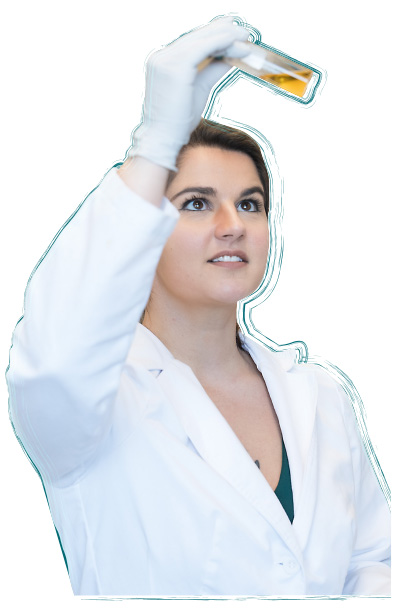

Some may argue the phrase “living the dream” is overused, but for Dr. Rachel Sheffler, first-year toxicology resident at the Michigan State University Veterinary Diagnostic Laboratory, it is truly the best description for her current role. From a very young age, Sheffler’s parents told her that she was going to become a veterinarian because of her interest in animals. But she says she gave up on that dream for a while because she wasn’t sure whether it was the right career choice with the highly competitive admissions process and rigorous curriculum.

. . . it’s my dream job, everything I ever wanted out of a career. And for the first time I feel like I am exactly where I am meant to be.
— Dr. Rachel Sheffler
“I realized after working in retail that I wasn’t going to be happy unless I pursued this dream. I’ll never forget assisting with a transtracheal wash as an undergraduate and one of the veterinarians saying ‘she’ll never be a veterinarian’ after the procedure. I was determined to prove him wrong,” Sheffler says.
“Now I’m here, and veterinary medicine combines everything I ever loved about science. In particular, toxicology combines everything I love about nutrition and biochemistry and the challenges of science.”
Initially, Sheffler planned to become a large animal veterinarian, and had a strong interest in nutrition. She thought she was on a path to becoming a nutritionist. But then she met Dr. Birgit Puschner, who introduced her to toxicology.
“I discovered toxicology was actually what I was looking for all along because it incorporates the complex biochemical pathways that I enjoy about nutrition and the challenges of complex cases that I enjoy about internal medicine and emergency cases,” says Sheffler. “I also love botany, and I get to explore a lot of poisonous plants through toxicology as well. It’s perfect for me—it’s my dream job, everything I ever wanted out of a career. And for the first time I feel like I am exactly where I am meant to be.”
But just because this is her dream job does not mean that it isn’t hard. One of the greatest challenges is helping to manage client expectations about diagnostic capabilities and how to interpret both negative and positive results.
“That is a very challenging balancing act, to ensure we are providing accurate interpretations and thinking about the implications of our results in the context of the case,” says Sheffler.
“There are cases where I have talked to a client and gotten off the phone and I’ve had to cry in my office and regroup before I go back into the lab. There are cases that are quite challenging—criminal investigations, starvation investigations, abuse investigations—those conversations can become very difficult. Some cases may require court appearances by senior faculty as an expert witness. You have to think about the implications of every word in your interpretation and every step of the assay that could be scrutinized by a legal team. We have to make sure we get it right.”
And yet the work is incredibly rewarding. Every day is something new and exciting, or possibly bizarre.
“I never know what to expect when I walk into work. From mice to whales and everything in between, I get to work on cases with species I never thought I would have the opportunity to see. I am thankful daily for the opportunity to consult with veterinarians and researchers across the United States. Our collaborations provide an opportunity to learn with each case and conversation,” explains Sheffler.
In her role within the Toxicology Section at the VDL, Sheffler reviews case submissions that come into the Laboratory for toxicology testing, interprets nutrition and toxicology results, provides phone consultation for case workup, and performs some laboratory work. Now halfway through the first year of a three-year residency, and a five-year PhD program in pharmacology and toxicology, Sheffler has diagnostic and research goals mapped out. In addition to learning about interpreting results of different assays run in the lab, she is also learning the methods to be able to perform those assays. Currently, she is working on method development for the Laboratory’s organochlorine pesticide panel and presenting wildlife pesticide data at this year’s Society of Toxicology annual meeting.
She also is looking forward to the opportunity to teach and interact with veterinary students, perhaps inspiring some of them in the same way Dr. Puschner inspired her.
“I’d like to help build a passion for diagnostics in the upcoming veterinary classes because I feel like diagnosticians often don’t get the recognition they deserve. We are such a core part of the veterinary team and sometimes diagnosticians get forgotten. Bringing that to the attention of veterinary students, I think, is very important. Students tend to be more comfortable talking
to residents and younger faculty
than to senior faculty, and if I can make that impression, that’s a positive impact I can have during
my residency.” 